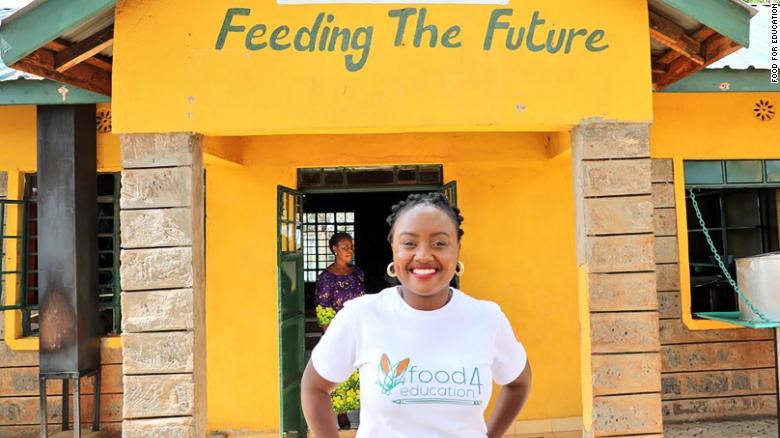AfricaBREAKING NEWSKenyaKenya Diaspora NewsNewsU.S Diaspora
This Kenyan nutritionist is keeping schoolkids fed — even during lockdown

Wawira Njiru is the founder of Food for Education.
This Kenyan nutritionist is keeping school kids fed — even during lockdown
The coronavirus crisis has forced schools in Kenya to close, but Wawira Njiru believes this is no reason for children to go hungry.
Wawira Njiru is a philanthropist, in Kenya who serves as the executive director of Food 4 Education, an organization that cooks, prepares and distributes nutritious meals, at subsidized prices to over 2,000 poor school children in Ruiru.
In 2012, the 29-year-old nutritionist founded non-profit Food for Education in her hometown, Ruiru, on the outskirts of the Kenyan capital, Nairobi. Her mission is to provide cheap and nourishing lunches to primary school children from poor families. To date, the organization has provided over 1 million meals.
Since schools closed a month ago, Njiru says she has been feeding more mouths than ever. Her focus has shifted to “how we can support kids while they’re at home,” she says
Food for Education is supplying dry staples such as rice, beans and maize for the 10,000 children enrolled on the school meals program, and their families. Njiru says it costs $2 to provide a week’s worth of meals for one person.
To make the switch from cooked school lunches to dry foods, Food for Education has restructured its operation, from meal planning, to sourcing, to delivery.
But at its heart, the mission remains the same: making sure no child has to learn on an empty stomach.
Food for thought
Njiru came up with the idea for Food for Education in 2012 while studying nutrition at university in Australia. She realized her skills could make a difference in her home country, where over a quarter of children under five suffer from chronic malnutrition, according to UNICEF.
Having started with just one stove and enough food for 25 kids, Njiru’s program has grown into a 24-hour kitchen, delivering meals to 13 schools, all in time for the lunch bell.
The meals of rice, beans and locally sourced vegetables are packed full of nutrients that children might be missing at home. Njiru says protein is often lacking in children’s diets because it’s “more expensive than carbohydrates and vegetables.” It’s essential for growth, however, so “our meals provide 40 percent of the recommended daily allowance for a child,” she says.READ MORE
Source:CNN





